 . . . THE CBZ JOURNAL
. . . THE CBZ JOURNALTable of Contents
 . . . THE CBZ JOURNAL
. . . THE CBZ JOURNAL |
May 2002 Table of Contents |
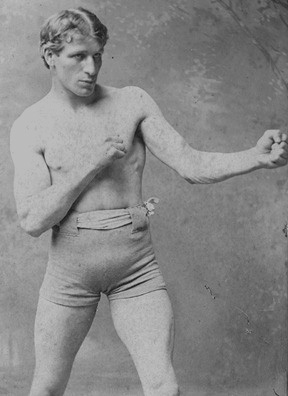 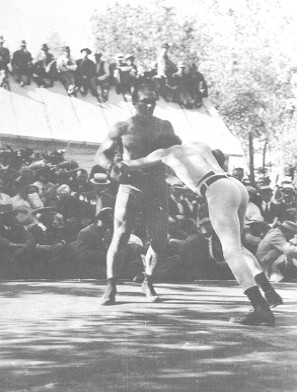 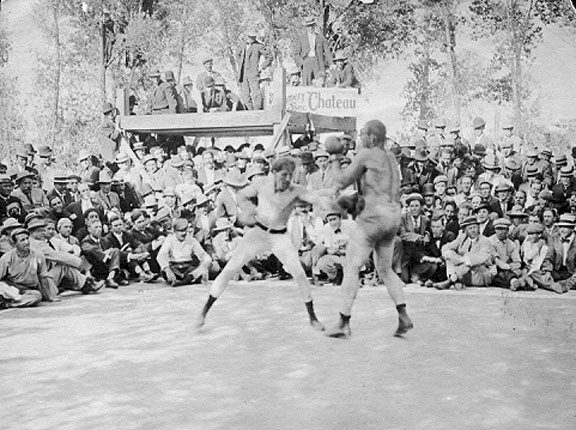 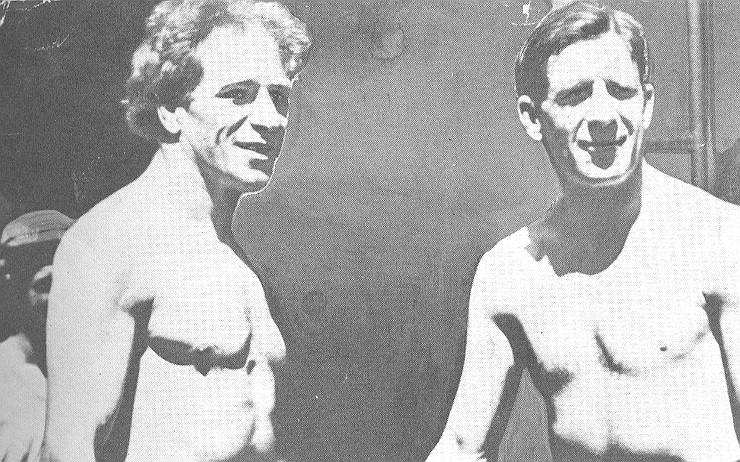 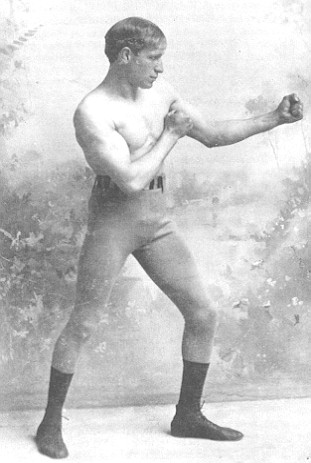 |
"CLEVER, SHIFTY, AND EXPLOSIVE" by Tracy Callis Joe Choynski was a world-class fighter who tangled with larger men on a regular basis. He was quick and clever, moved well, had fistic savvy, and was game to the core. Joe usually fought at 162-178 pounds but never hesitated to "get it on" with heavyweights. History has recorded that Choynski was a terrific hitter. He belonged to that special group of fighters whose hitting skills and power far exceeded their size. Other members of this group include Bob Fitzsimmons, Jack Dempsey, Sam Langford, Stanley Ketchel, Joe Walcott, Terry McGovern, Jimmy Wilde, and Bob Satterfield. Sports reporter Howard Smith once wrote, "Old-timers claim that Joe was the sharpest hitter of all time. Not the hardest, understand, for Joe was little more than a middleweight. But he could put every ounce of his 172 pounds behind a precision punch that had been prepared through rounds of maneuvering his opponent" (see Kramer and Stern, 1974 p 341). "He had a terrific wallop, as Corbett has testified", confirmed Johnston (1936 p 105). The fact is that Choynski was a well-coordinated athlete who thoroughly understood how to fight another man. He manipulated his man around the ring, set him up with various tactics, and when the time was right - seized the moment to impart a solid smash to his adversary. The New York Times noted that Choynski was "in no sense a killer, but a forerunner of the type of fighter who learned early the value of science over brute strength" (see Kramer and Stern, 1974 p 341). Jack Johnson once said, "Jeffries had a solid wallop and Fitz[simmons] could knock your head off but that man Choynski could paralyze you even when he didn't catch you flush. In my opinion, he was the hardest hitter, pound for pound, of the last 50 years ... I think his left hook was much more effective than either Dempsey's or Louis's" (see Blady 1988 p 27). Hype Igoe, famous boxing writer, asserted, "Little Joe Choynski, he of the devilish punch, would have had a royal chance with Joe [Louis]" (see Igoe, May 1936 p 4). Roberts and Skutt (1999 p 64) wrote, "Although not an overly large man at 170 pounds, Choynski made a name for himself fighting top heavyweights." During his career, he fought six Heavyweight Champions - John L. Sullivan, Jim Corbett, Bob Fitzsimmons, Jim Jeffries, Jack Johnson, and Marvin Hart. He also traveled with Peter Jackson across America as a sparring partner. In addition, he fought Charles "Kid" McCoy and "Philadelphia" Jack O'Brien, Light-Heavyweight Champions. Some "name" opponents that Joe defeated during his career were Frank Glover, Billy Wilson, Mick Dooley, Billy Woods, "Denver" Ed Smith (two times), C.C. Smith, Denny Kelliher, Jack Fallon, Bob Ferguson, Mike Boden (two times), Jack Cattanach, Jim Hall (two times), Joe McAuliffe, Herman Bernau, Ed Dunkhorst, "Mexican" Pete Everett, Dick Moore, Steve O'Donnell, Peter Maher (two times), "Wild" Bill Hanrahan, Al Weinig (two times), Frank Childs, and Nick Burley. Stillman (1920 p 90) spoke of Joe's fighting skills, "He was very quick on his feet, had a fine straight left hand and also a powerful right. He depended upon a straight left and a straight right for his execution." Johnston (1936 p 105) called Choynski, "one of the trickiest, as well as one of the most skillful fighters of that period." Recall that Choynski fought mostly in a period when there was no Light-Heavyweight Division. Odd (1976 p 67) called Joe, a "middleweight who was a match for most heavyweights, making up with cunning what he lacked in size." Stillman (1920 p 90) contended, "A gamer fighter never entered the ring, and he was very scientific but did not weigh enough to gain a championship." Pardy (Apr 1936 p 15) added, "An accomplished scientist, sharply accurate puncher and wily general, Choynski only lacked weight to be a real champ." Joe was not a brutal man but a thinker who grew up in an intellectual family.. His father, Isadore Nathan Choynski, attended Yale University and received a teaching certificate. As a young man in California, he [Isadore] worked as a reporter and later published his own newspaper called Public Opinion (see Blady 1988 p 29). The New York Times called Joe "Soft-spoken and scholarly." The San Francisco Examiner observed, "Unlike many of the bruisers of the era when two-ounce and skin tight gloves were used ... Choynski was highly intelligent and well read in the classics, and often in his correspondence referred to some quotation to make a point" (see Kramer and Stern 1974 p 342). In the ring, Choynski was alert with a wonderful presence of mind and rarely fell into traps. He moved, slipped punches, countered, and when he got his man off balance or leaning a little too much, he suddenly shot over his sharp, well-timed, paralyzing punches. Blady (1988 p 27) described Joe, "A keen observer, an intellectual who could learn from experience, Joe was the embodiment of the working class renaissance man. Physically gifted, he developed muscular arms and shoulders at his twin trades of candy puller and blacksmith. Joining his strength with empirical savvy, he became a master boxer with a devastating punch." In spite of his well-ordered family environment, Joe had a somewhat rowdy youth. He dropped out of school and hung around the docks. During this time, he held a number of jobs and got into fisticuffs regularly. He took up amateur boxing and won the Pacific Coast Championship in 1887 when he defeated Billy Keneally in four rounds (Blady 1988 p 29). As youths, the brothers Choynski, Joe and Herbert, were very competitive with the brothers Corbett, Jim and Frank. The many exchanges of challenging words finally led to boxing contests between Joe and Jim. The two fine young boxers engaged four times. Joe was at a disadvantage since Jim was bigger and faster. Corbett was also one of the slickest boxers ever to enter the ring. But, Choynski was an exceedingly talented pugilist as well. Their contests were extremely competitive. One bout lasted 27 rounds before the larger Corbett prevailed. Joe was bruised and cut. Jim had two bruised knuckles and a fractured thumb. Both men were exhausted. Historian Frank Menke described this fight as "one of the epics of pugilism, for duration of savagery it perhaps never had its equal" (Blady 1988 p 32). Although Corbett succeeded in defeating Choynski, he was exhausted and so totally extended that his seconds had to tell him it was over. Billy Delaney, trainer of Corbett (and, later, Jim Jeffries) and observer of hundreds of bouts during his career, said this fight was the "fiercest he ever saw" (Corbett 1926 p 88). William Doherty, old-time Australian Heavyweight Champion, recalled the fights in 1891 between Choynski and Joe Goddard, the Heavyweight Champion of Australia. Goddard was a man whose strength, ruggedness, and determination was similar to that of Jeffries but not as great. Doherty (1931 pp 81-82) wrote about Joe, "One punch of Choynski's stands out unforgettably clear in my memory ... it was a masterpiece delivered by a master ... straight as a sword-thrust, perfectly timed, perfectly placed, with all the speed and power and weight behind it that a trained and skillful athlete could command. And just as though he had been struck by lightning, Joe Goddard crashed to the boards and lay still ... By all the rules and traditions of the game such a punch should have kept the strongest man down and out for keeps." Joe broke the jaw of Jim Fogerty in 1890 at Sydney, Australia. He downed Joe Goddard several times before succumbing to the larger, bullish man. He went 34 rounds against the larger Billy Woods before knocking him out. He knocked out Billy Wilson, a tough 185 pounder in 2 rounds. On June 18, 1894 at Boston, he and Bob Fitzsimmons waged an explosive "puncher's war" that exhibited terrific hitting before the police interrupted it. Lardner (1972 p 104) described the Choynski-Fitzsimmons match as "friendly until the third round, when Choynski espied an opening and uncorked a terrific right to the point of Fitz's chin. Fitzsimmons fell down in a heap, a look of surprise on his face, and barely got up before being counted out." Johnston (1936 p 105) wrote, "Choynski saw an opening that he couldn't resist and trickily shot through one of his terrible rights to the point of the jaw. Fitz went down like a pole-axed steer ..." When the rugged youngster, Tom Sharkey, fought Choynski on April 16, 1896 at San Francisco, the only condition for Tom to win was - to go the distance. Johnston (1936 pp 109, 111) wrote, "Choynski started off like Jove hurling thunderbolts. He simply beat up the clumsy sailor for two and a half rounds." Sharkey got in some of his usual foul blows and Joe was forced to take time and recuperate as a result. When fighting resumed, Joe "proceeded to slash and hammer Sharkey all over the ring." However, the bullish Sharkey managed to last and claimed victory after taking a "terrific whaling of the sort that Joe could hand out" (see Johnston 1936 p 109). On November 30, 1897, Choynski boxed the young and upcoming Jim Jeffries at San Francisco. Lardner (1972 p 127) asserted, "Jeffries realized, after a bout with Choynski which nearly resulted in his jaw becoming unhinged, that his defense needed improving." Jeffries described his fight with Joe, "Choynski rushed and we went at it hammer and tongs, with the crowd going wild. He fought so fast he was all over me ... He convinced me that he was not only the cleverest boxer I had ever seen but also a terrific hitter. He fought so fast I could not use what skill I had to best advantage, and was taking a wonderful boxing lesson every minute ... He hit me so hard he broke my nose and wedged my lip between my teeth. He drove my head so far back I thought my neck stretched a foot ... During the remainder of the fight I knocked Choynski down three times but at the end of the battle [Referee] Graney called it a draw ... I had no regrets. I had taken a boxing lesson from a master and an artist ..." (see Fullerton, 1929 pp 78-81). In an interview with Nat Fleischer, Jeffries credited Choynski as being an extraordinary hitter. Wrote Fleischer, "Then Jeffries told of one of the hardest punches he ever took. He said it came in the tenth round of his fight with Choynski and was a right smash to the mouth. It drove his upper lip between the two front teeth and so bothered was he by the injury that he had his seconds cut away a piece of the lip to release it." Jeff also stated, "Choynski at his best was only a light light-heavyweight, yet could punch harder than most heavyweights" (see Fleischer, 1950 p 25). During his career, Choynski got into the ring with Kid McCoy four times. McCoy was truly a great fighter, one of the best ever. But, Joe was pretty good too. The Kid learned enough about Joe during their first session on March 21, 1896 at New York to know he was dangerous. Cantwell (1971 pp 63 64) wrote, "If there was one fighter (other than Jim Jeffries) McCoy did not want to fight, it was Joe Choynski." He added, "he [Joe] was a good boxer, marking a kind of halfway point between the old school of rough-and-tumble fighters and the modern ring craftsmen like Corbett and McCoy." Their second encounter took place at San Francisco, on March 24, 1899. It was a scientific matchup, void of the vicious fireworks that usually accompanied a McCoy or Choynski bout. McCoy was in one of his "Corbett-like" modes and schooled Joe on the finer points of boxing over twenty rounds. He even floored Joe in rounds nine and seventeen. The two boxed a draw on October 6, 1899 at Chicago and, then, on January 12, 1900 at New York, Joe tangled with the crafty Kid for the fourth time. Prior to the fight, McCoy was quoted by the Chicago Tribune as saying, "Choynski is not a man for anybody to hold lightly, either in cleverness or hitting power." Truer words were never spoken. The first round saw a few sharp blows struck by each man, with McCoy having the advantage. Round two was witness to "Choynski fury" as he decked McCoy with a sharp right to the jaw. The Kid was up at nine but Joe sent him down again with a sizzling left to the point. Two more times McCoy was downed and at the end of the round, he went to his corner bleeding badly from the nose and mouth. Choynski thought he had put his man down for keeps but the timekeeper rang the bell before McCoy was counted out. Saved by the bell, McCoy rushed from his corner for round three and fought like a crazy man. Choynski was equally aggressive. Both men tossed caution out the window and let fly with bombs. Once more, Joe caught the Kid with a blistering right and sent him down for a count of seven. When he arose, they went at it viciously. McCoy hooked a right just as Choynski landed a left and both men went down. They got up, rushed at each other, and were mixing it up as the bell rang. Neither man heard the bell and the Kid got in a wicked right to Joe's jaw. Down went Joe amidst cries of "foul." He had to be carried to his corner. When the bell rang for the fourth round, Choynski was unable to respond and McCoy was declared the winner. Ted Dorgan, boxing writer and cartoonist for the New York Journal, wrote about the fight, "Joe Choynski KO'd Kid McCoy last night by all that was fair and holy, but was a victim of a deploring plot. He had McCoy knocked out in the second round but the bell was rung one minute ahead of time, saving the Kid from being counted out. Then, to make things even more unbearable, the minute's rest period was extended to two full minutes, giving McCoy plenty of time to clear" (see Blady, 1988 p 34). The New York World reported "The Californian really knocked the Kid down and out for twelve seconds in the second round. Joe Dunn's error saved him." The New York Sun wrote, "An unfortunate mistake by the timekeeper of the club in the second round probably saved McCoy from being put to sleep." However, referee John White stated, "McCoy was not knocked out. I counted nine and McCoy got up just as I counted ten. Then the bell rang and I and the fighters thought the round was over" (see Chicago Tribune, Jan 13 1900). A month later, on February 16, 1900 at Chicago, Joe fought Peter Maher, the awesome hitting heavyweight. Maher was a bigger man but was not in the best physical condition. Each man respected the hitting power of the other and the bout was fought mostly at long range. However, a few seconds before the bell sounded to end round one, Choynski slipped inside and belted Maher with a sizzler that "rang his chimes" and left him dazed and uncoordinated. Had it taken place a little earlier, Joe might have finished him then and there. In round two, Choynski was down but got up and went the distance - six cautious rounds - to finish fresh to gain the win. Maher was all fagged out. Some stories have it that Maher damaged a couple of Joe's ribs during the match. Other accounts say that as Joe was leaving the building after the contest, he slipped on ice and fell, injuring a shoulder and ribs. Whatever the case, he was scheduled to meet Kid McCoy the following week (February 23, 1900) at New York. Joe explained to the businessmen in the Big Apple that he could not fight because of his injuries but was told a "deal is a deal" and he must honor his contract. As it turned out, McCoy somehow got out of his end of the deal and Joe Walcott was substituted. This lighter opponent would not be as difficult, said the fight promoters, so Choynski agreed to go ahead with the bout. It was a big mistake because, as small as Walcott was, he was an all-time great, a tremendous hitter, and tough as nails. He knocked Choynski down several times. Joe fought back as best he could with his disabling and painful injuries but was no match at this time for his stocky, 5' 1" adversary. Choynski pulled off the unbelievable on February 25, 1901 at Galveston, Texas when he knocked out the future great, Jack Johnson. According to Lardner (1972 pp 73-74), "Johnson called Choynski's punch in his temple the hardest punch he received in his ring career." He later described Joe's knockout of Johnson (1972 p 171), "... in the third round the dark-haired San Franciscan struck him [Johnson] a left-hand blow on the temple - a sensitive point in any man - that knocked Johnson flat and left his head ringing." Dan Cuoco, boxing historian and Director of IBRO (International Boxing Research Organization), wrote the following (2002, private correspondence), "Joe Choynski was a fighter's fighter. He was fearless, clever, and an accurate, crisp power-puncher who knew his way around the ring. A little more than a light-heavyweight, but he fought the likes of Jack Johnson, Jim Jeffries, Bob Fitzsimmons, James Corbett, and countless other all-time greats and near greats. Choynski fought draws with Jeffries, who outweighed him by 50 pounds, and Fitzsimmons. Choynski's greatest victory was his third round knockout of future heavyweight champion Jack Johnson. Choynski was one of the hardest punching fighters to ever enter the ring. " Jan Skotnicki, historian and member of IBRO, considered Choynski to be one of the best pound-for-pound fighters ever and rated Joe as the #8 All-Time Light Heavyweight (1994, private correspondence). DeWitt Van Court, boxing instructor of the Los Angeles Athletic Club rated Choynski as the #4 All-Time Light Heavyweight and commented about him (1926 pp 105 108), "He was a remarkable fighter who never considered his opponent's weight or size. Joe was one of the hardest hitters of the ring. A fine boxer, very game and fast, but lacked the stamina to take punches. It was Joe Choynski who hit Jim Jeffries the hardest blow he ever received. He fought for over twenty years, meeting all comers." Boxing historian R.A. Haldane wrote that Joe Choynski was called the "greatest Jewish heavyweight of all time." The Universal Jewish Encyclopedia names outstanding fighters like Daniel Mendoza, "Dutch Sam" Elias, Israel Belasco and makes the following remark "[Joe] Choynski, with the exception of Mendoza, was the greatest Jewish heavyweight even though he never won the heavyweight championship." (see Kramer and Stern 1974 p 334). Choynski is described as "the greatest of all modern Jewish heavyweights" by Blady (1988 p 26), who later reported (1988 p 37) that, "Joe Choynski has been acclaimed by E.J. Muller, the [a] Director of the San Francisco Historical Boxing Museum, as that city's 'greatest uncrowned champion'. In 1960, he [Joe] was elected to the Boxing Hall of Fame." Lardner (1972 p 73) wrote about Choynski, "he was a shrewd ring general and a tremendous natural puncher. If he had fought in a different era from this - which has been called the golden era of heavyweights - or if he had been luckier, he might have been heavyweight champion of the world." Pardy (Apr 1936 p 16) wrote, "Many instances could be quoted of Choynski's gameness under fire, of his cleverness, endurance, and intelligence both inside and outside the ropes. The truth is he lived in an age of formidable heavyweights, so formidable that only a fighter of rare genius could have attained the position he did among them. What a sensation a second edition of Joe Choynski would create in modern ring circles." Jim Corbett (1926 p 38) said, "Joe Choynski - in my estimation, [was] one of the gamest and best fighters that ever lived, though a little bit too light for the heavyweight class. He was really as good as most champions I have seen, and this statement covers a period of nearly fifty years." In the opinion of this writer, Choynski was one of the best men ever at his weight. His skills were equal to those of Billy Conn, Billy Miske, and Tommy Gibbons. He probably should be rated among the All-Time Top Ten Light Heavyweights in boxing history. He definitely should be ranked among the best "Pound-for-Pound" fighters in boxing history. Choynski was elected to the Ring Boxing Hall of Fame in 1960 and the International Boxing Hall of Fame in 1998. Credits: A special "thank you" goes to Mark Dunn (of Bloomington, Illinois) for supplying pertinent data related to Joe Choynski. Also, my "thank you" goes to Eric Jorgensen (of Los Angeles) for his suggestions that improved this article. References Blady, K. 1988. The Jewish Boxers' Hall Of Fame. pp 25-37. New York: Shapolsky Publishers, Inc. Bodner, A. 1997. When Boxing Was A Jewish Sport. Westport, Ct: Praeger Publishers Cantwell, R. 1971. The Real McCoy. Princeton, NJ: Auerbach Publishers, Inc. Chicago Tribune. January 12 1900; January 13 1900. Corbett, J. 1926. The Roar of the Crowd. Garden City, Y: Garden City Publishing Company Cuoco, D. 2002. Private correspondence. Doherty, W. 1931. In the Days of the Giants. London: George G. Harrap & Co. Ltd. Fleischer, N. Oct 1950. "Jim Jeffries Talks About Great Fighters of His Era" (contained in The Ring, October 1950, p 25) Fullerton, H. 1929. Two-Fisted Jeff. Chicago: Consolidated Book Publishers, Inc. Igoe, H. May 1936. "Dempsey or Louis?" (contained in The Ring, May 1936 pp 2-5) Johnston, A. 1936. Ten - And Out! New York: Ives Washburn, Publisher Kramer, W and Stern, N. 1974. "San Francisco's Fighting Jew" (contained in the California Historical Quarterly, Vol. 53, No. 4, 1974) Lardner, R. 1972. The Legendary Champions. New York: American Heritage Press Odd, G. 1976. The Fighting Blacksmith. London: Pelham Books Ltd. Pardy, G. Apr 1936. "Titles Beckoned, But They Didn't Make It" (contained in The Ring, Apr 1936 pp 14-17) Roberts, J. and Skutt, A. 1999. The Boxing Register. Ithaca, NY: McBooks Press Skotnicki, J. 1994. Private correspondence. Stillman, M. 1920. Great Fighters and Boxers. New York: Marshall Stillman Association Van Court, V. 1926. The Making of Champions in California. Los Angeles: Premier Printing Company |
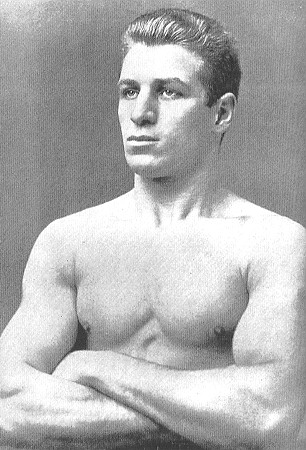 Profiles by Tracy Callis Muhammad Ali Jimmy Barry Jim Corbett Jack Dempsey Nonpareil Jack Dempsey Bob Fitzsimmons Joe Frazier Larry Holmes Peter Jackson Jim Jeffries Jack Johnson Sam Langford Sonny Liston Joe Louis Rocky Marciano Jack McCauliffe Kid McCoy Terry McGovern Billy Miske Philadelphia Jack O'Brien Tommy Ryan Sailor Tom Sharkey John L. Sullivan Gene Tunney |
| Schedule | News | Current Champs | WAIL! | Encyclopedia | Links | Store | Home |
|
>>>>[Return to Top]<<<<
©2001 CBZ Media, Inc. -- All Rights Reserved |